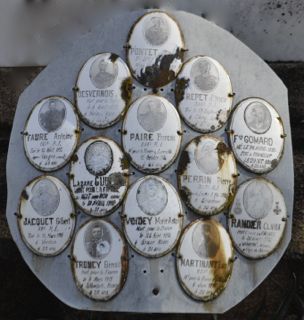Twenty-seven thousand. That is how many french soldiers were killed on the 22nd of august 1914, in the battles around Lorraine and the rest of North of France. One day only. French soldiers only. The Germans won this part of the battle, but also suffered losses. At the same time there were battles going on between Austrians and Serbs around Belgrade, with enormous amounts of casualties on both sides.
I have seen the war cemeteries in France and Belgium, I knew there were millions of deaths, but such a massacre on just one day fighting came as a surprise to me.
In the past years, when we were in England, the BBC news would always announce when a soldier had died in Irak or Afghanistan. First they would announce ‘a soldier’ had died and that ‘the family has been informed’. A few days later they would give the name of the soldier who had died. There were also the times that the arrival of the corpses in England, flown in with groups, would also be reported on. It kept people aware of the terrible suffering of being involved in warfare, and was one of the reasons why these wars became so unpopular I am sure.
Let us assume the news broadcast of the 22nd of august. The war had been going on for hardly two weeks. Great Britain wasn’t even involved yet. Can one imagine a radio broadcaster saying: today there has been a battle in the north of our country. 27.000 of our men have died. The family of those involved have been informed. And the news a few days later that would have lasted a good hour just announcing all the names from the people involved. And then imagine a quote from one of the french commanders, commenting on the particular battles in Lorraine: ‘On the whole, results hardly satisfactory.’
This was the most horrific date in WWI, but there would be many extremely cruel ones to follow.
I wondered if it would be the most deathly day in war. It isn’t. The atomic bombs on Hiroshima and Nagasaki were the worst, with around 100.000 deaths each. Imagine announcing that on television. Even on American television. Americans would have had their own horrible experiences. In the Civil War on the bloodiest day, about 20.000 soldiers died on both sides combined.
Compare this to the 58.000 Americans killed in Vietnam, or to the about 5000 Dutch people killed in the five day battle with Germany before Holland surrendered to the Germans. In Afghanistan in more than ten years of fighting fewer than 500 Brits died.
This story is getting nowhere. I am just trying to get a grip on these numbers. I am imagining the cruelties of warfare. I am thinking about how it would have been to live in France around 1914. Imagining this has become much easier because of the vivid descriptions of the battles in Max Hastings’ book.
One thing is for sure. I will look with renewed respect for the war memorials. For the first time I will also be able to deduct in which battle the different soldiers have died. That is, as long as the battles are in 1914, because Catastrophe only covers the first year of the war.
I suspect Hastings will write separate books about the following war years in the coming years. I will be an enthusiastic reader of each volume to come. And probably be a pacifist – again, after my idealistic days between ages 17 and 18 – long before I have finished those books.
27 jan

Share


Leave a Reply